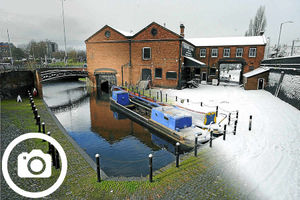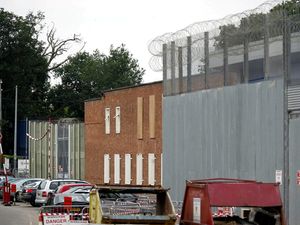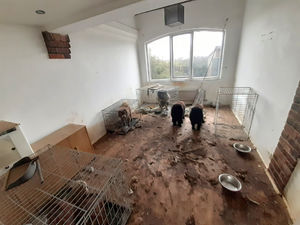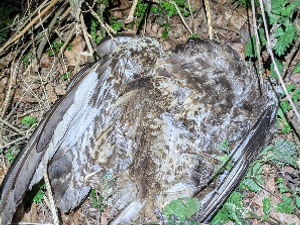Snowy scenes one year on
[gallery] It has been one of the mildest winters anyone can remember . . . so far at least. And as a series of images show - morphed by the Express & Star - a year can make all the difference.

January was wet and pretty miserable, particularly for people living in the flood-hit south of the country.
But the West Midlands has largely escaped the harsher weather unscathed, with barely a sprinkling of snow until this week – certainly nothing like 12 months ago.
Last January the Red House Glass Cone in Stourbridge looked more like a giant had dropped a whippy ice cream, as its iconic red bricks were covered by snow.
And boats moored on the canal at Broad Street near Wolverhampton city centre looked less than inviting as temperatures plunged last year.
Now, however, their bright colours cheer up an otherwise gloomy looking day.
Men clad head to toe in thermals and high-visibility gear were keeping the snow from impeding the Midland Metro trams last year, while cars travelled slowly around the Bilston Street island. There are no such worries about the weather this year.
Of course, the snow can have its advantages in creating a magical winter scene.
The structure of the iconic iron bridge of Ironbridge was only accentuated by the snow last year.
But it must have been a less than pleasant experience for walkers by the River Severn to have to navigate the snow-covered cobbles.
Still, it beats having to deal with heavy, persistent rain.
Likewise, Lichfield Cathedral looked even more imposing on the skyline, covered in white, with snow-capped trees in front of it, than it does on a rather dull and dreary day in 2014.
But at least for schools it means that classes can carry on as normal without the need for parents to take the day off work or be constantly checking on the internet for updates about closures.
And pupils at the Shrewsbury School are able to carry on and do their outdoor PE lessons.
While other parts of the country have been hit by flooding and raging storms, for the West Midlands it has so far been one of the mildest winters anyone can remember.
To be precise, it's the mildest winter since 1988 with barely so much as a frost since November.
There is even a chance of spotting a few daffodils over the next few weeks if they get confused into thinking spring is here.
That, of course, is all dependent on the mercury not plunging now that people are tempting fate by daring to remark at how mild it has been.
Last year the average temperature was 3.3C (38F). Now it's getting to an average of 5.1C (41.2F).
That means January has been one of the 10 warmest since records began in 1910 and it is the warmest the country has had since 2007.
Met Office spokesman Laura Young said: "It has been mild because most of our weather this winter has come from the west.
"The air comes across from the Atlantic and it warms up as it blows across.
"It is the same westerly wind that makes it stormy and wet.
"It has been very mild. But we are so far only halfway through winter and that could all change.
"Just a few weeks of cold weather will really bring the averages down.
"Over the last few weeks we have returned to a pattern of colder nights and warmer days, whereas in December there was little change overnight."
The start of February is not shaping up to be a snowy one either.
The Met Office forecasts that the West Midlands was going to have a windy weekend with occasional showers and probably persistent rain on Monday. But it is still a lot better than people living and working in parts of southern England have been experiencing.
Figures show that it is the wettest January for places such as East Devon and Kent since way back in 1910.
South-east and central southern England has received more than twice its average rainfall – with 175.2mm (6.9in) between January 1 and 28.
This figure beats the previous record of 158.2mm (6.2in) of rainfall which was set in January 1988.
The rainfall across south-west England and south Wales reached 222.6mm (8.7in) in the same period – making last month the fifth wettest on record and the wettest since 1995, when 224.4mm (8.8in) fell.
Soldiers have even had to be deployed to Somerset to bring relief to villages that have been cut off by flooding.
The Government agreed to send the Army to the Somerset Levels, after the most significant flooding for 20 years.
Drainage experts blame two decades of under-investment in flood defence work for turning the Levels into a 'disaster area'.
And they said it was 'very, very urgent' that rivers are dredged to prevent more damage to homes, livelihoods and wildlife.





